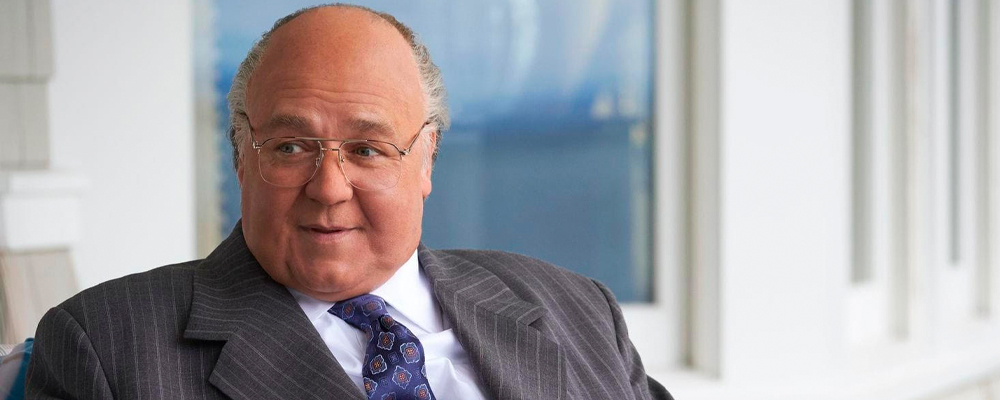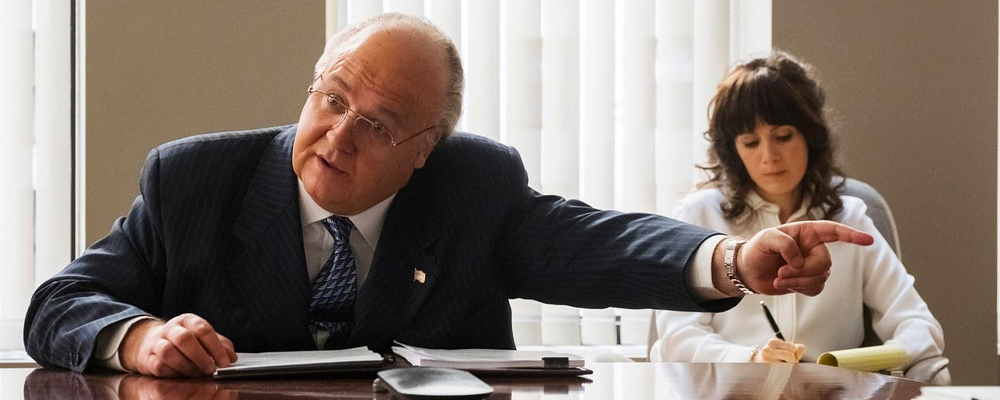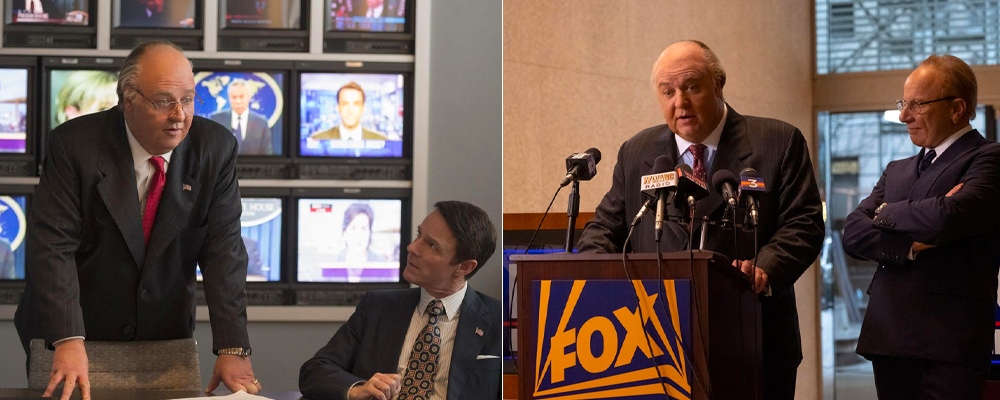‘The Loudest Voice’: Russell Crowe Transforms Into Fox News Overlord Roger Ailes
Alci Rengifo
The best way to describe Showtime’s “The Loudest Voice” is morbidly fascinating. More than a biography, it’s a 7-episode, dramatic chronicle of the evolution of TV news over the last twenty years or so. Russell Crowe, caked under pounds of makeup, portrays Roger Ailes, who set up and ran Fox News long before becoming another power player outed by the #MeToo movement. Blumhouse Television shares producing credit, which explains how the series sometimes feels more about the sensational details than about Ailes as a person. Or maybe that’s the point. The man lived exactly like what he put on TV.
We open in 1995 and Ailes (Crowe), who cut his teeth as a Washington insider who advised Nixon, is forced to leave CNBC. He soon gets tapped by Newscorp head Rupert Murdoch (Simon McBurney) to start a new cable news channel, Fox News. Cable news is coming into its own, with the trend started by CNN sprouting new names like MSNBC. Ailes convinces Murdoch that the best way to beat the competition is to counter what he sees as a liberal dominance of media. By appealing to the conservative base, Fox can easily leap over the other networks. With the billionaire’s consent Ailes surrounds himself with acolytes like Brian Lewis (Seth MacFarlane), Laurie Luhn (Annabelle Wallis), who is also his mistress, and ultra-loyal secretary Judy Laterza (Aleksa Palladino). The hunt begins for talent and staff, with Ailes dismissing traditional ideas concerning journalistic ethics. He wants everything loud, rude and preferably blonde in short skirts. Fox News launches in 1996. It is the terrorist attacks of September 11, 2001 that give Ailes a true taste of political power, as the Bush White House actively uses the channel to push its agenda for invading Iraq. As Ailes’s influence grows, his affair with Luhn gets darker, as do his other urges towards female employees.
The first four episodes were made available for review, giving a sense of how “The Loudest Voice” moves with the feeling of an expose. One of the co-creators and writers is Tom McCarthy, who directed the 2015 Best Picture Oscar-winner “Spotlight,” about the Boston Globe’s investigations into the Catholic Church’s cover-up of child molestation. In this limited series the angle is on how journalism has been corroded by mass media, and how an overbearing ideologue like Ailes takes advantage to push agendas, while growing in personal power. The style of the series is jagged and scandalous, like Ailes himself. He calls 4 a.m. staff meetings to fire any whiners and rally everyone to his vision, he may not practice the best family values, but he is deadly serious about defending wealth, private property and being suspicious of Muslims. Even Murdoch looks worried about how far Ailes will go, angering him when he tries to assure the Barack Obama campaign in 2008 of fair coverage. Ailes would rather emphasize Obama’s middle name, “Hussein,” and wonder aloud if the future president was even born in the United States (passing along the idea to a certain Donald Trump). Like many public figures of the period, the 9/11 attacks completely turn Ailes into something more intense than his previous, conservative self. Per this show, it was that event that prompted Ailes to fully transform Fox News into a political weapon. Much of the editing in these moments is almost dystopian, particularly in the way news clips are cut together with pounding music and names, dates and information is relayed with electronically distorted lettering. Blumhouse, which has also produced the “Purge” films and TV show, would naturally find an Orwellian approach to Fox News. Ailes even mounts a surveillance system to keep an eye on everyone at the office, looking puzzled when he’s told cameras can’t be placed in the bathrooms.
But before the attacks in New York, the series almost has mischievous fun dramatizing Aires hiring famous Fox firebrands like Sean Hannity (Patch Darragh), who is at first dismissed by producers as a mere shock jock, but that’s precisely what Ailes wants. He also desires to make right-wing theater with sexual appeal as he demands to see more legs on air. While supervising a taping of Hannity’s original show, Ailes gleefully instructs that no makeup be put on the liberal co-host (the now forgotten Alan Colmes) because he wants to see him sweat. Another famous name from conservative American media land, Glenn Beck (Josh McDermitt), pops in, seen as a whacko by staffers but loved by Ailes. The key Fox personality in this tale is Gretchen Carlson (Naomi Watts), who knows how to subtly work with Ailes even as his leering eyes treat her with condescension. He asks her to twirl for him and hints when she makes inquiries or complaints, that he can help her if she gives in to him. It was Carlson who would later become the main voice to expose Ailes as a serial harasser and abuser.
If the storytelling gets slightly clunky it’s because a balance is attempted between the history of Fox News and Ailes’s backroom abuses. Some critics have pointed out how obvious Russell Crowe’s makeup is, but it actually makes him quite the creeper. The look is fitting because Ailes was creating artificial realities, and he himself lived a cosmetically misleading life. His wife Beth (Sienna Miller) is committed to the conservative cause, to the point of plotting the takeover of a local newspaper to turn it into a mouthpiece against the surrounding liberal culture. But she is unaware that in his office Ailes exercises his power through other, sexual ways. He turns Luhn into a servant fulfilling his fetishes in hotel rooms, when she becomes tired of the arrangement he promptly takes away her post at the Fox News office. Breaking with Ailes is not easy however and she grows paranoid, convinced the man has people following her. Crowe plays Ailes like a large, quiet menace, prone to exploding if he doesn’t get his way but hitting on women with ominous crass. “The Loudest Voice” is the first big limited series to tackle one of the figures, who along with Harvey Weinstein and Kevin Spacey, defines the image of the powerful boss exposed in this ongoing, cultural reckoning post-#MeToo. Crowe manages to convey how such personalities operate.
Much of “The Loudest Voice” is based New York Times reporting done by Gabriel Sherman, and Sherman’s book of the same name. Every episode indeed feels like a cold investigation. The tone lacks satire or even depth when it comes to analyzing Ailes, we don’t get the daring approach of a movie like “Vice.” But it is nonetheless a fascinating take on both Ailes’s public persona and the media culture that continues to influence political discourse. When Ailes rants about Obama being a closet communist or about appealing to the forgotten deplorables, the series is not implausible in showing a thread leading to where we are now. There’s a moment in front of a crowd where Ailes even chants, “make America great again.” Then he would go into some office and become a sexual predator, imposing his will on women working for him. Certainly there are other, broader ways to tackle this subject, but “The Loudest Voice” still does it in a way that merits attention. Roger Ailes died in 2017, but Fox News isn’t going anywhere anytime soon.
“The Loudest Voice” premieres June 30 and airs Sundays at 10 p.m. ET on Showtime.




